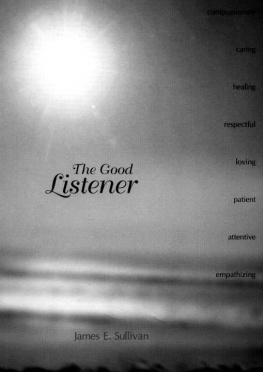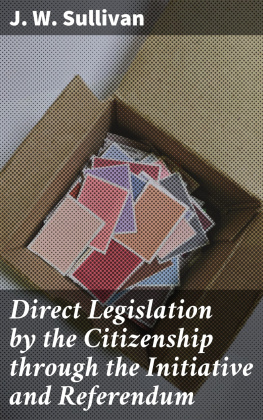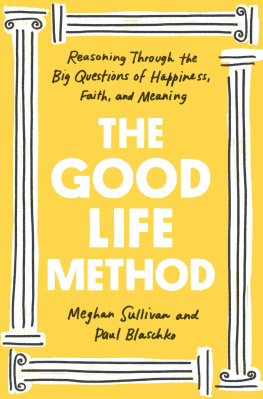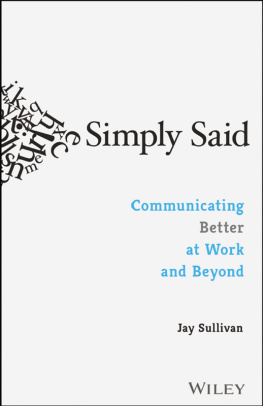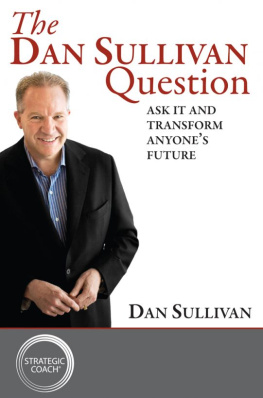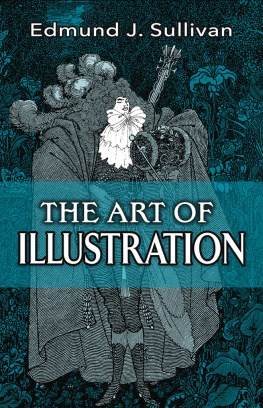James E. Sullivan - The Good Listener
Here you can read online James E. Sullivan - The Good Listener full text of the book (entire story) in english for free. Download pdf and epub, get meaning, cover and reviews about this ebook. genre: Religion. Description of the work, (preface) as well as reviews are available. Best literature library LitArk.com created for fans of good reading and offers a wide selection of genres:
Romance novel
Science fiction
Adventure
Detective
Science
History
Home and family
Prose
Art
Politics
Computer
Non-fiction
Religion
Business
Children
Humor
Choose a favorite category and find really read worthwhile books. Enjoy immersion in the world of imagination, feel the emotions of the characters or learn something new for yourself, make an fascinating discovery.
- Book:The Good Listener
- Author:
- Genre:
- Rating:4 / 5
- Favourites:Add to favourites
- Your mark:
- 80
- 1
- 2
- 3
- 4
- 5
The Good Listener: summary, description and annotation
We offer to read an annotation, description, summary or preface (depends on what the author of the book "The Good Listener" wrote himself). If you haven't found the necessary information about the book — write in the comments, we will try to find it.
The Good Listener — read online for free the complete book (whole text) full work
Below is the text of the book, divided by pages. System saving the place of the last page read, allows you to conveniently read the book "The Good Listener" online for free, without having to search again every time where you left off. Put a bookmark, and you can go to the page where you finished reading at any time.
Font size:
Interval:
Bookmark:

fjs terser
James E. Sullivan

This book is gratefully dedicated to my dear friends, the late Betty Gately and Fr. Tom Mannion, two of the world's best listeners.

During my twenty-six years as director and fulltime counselor at the Religious Consultation Center for the diocese of Brooklyn, I was privileged to work with hundreds and hundreds of clients: priests, religious sisters and brothers, and lay persons. They were sincere, caring people, but they were hurting-many of them hurting terribly. They were anxious, depressed, emotionally confused, and many felt trapped and helpless.
Their pain touched me very deeply. Above all, I was saddened to see the gnawing hurt that seemed to be the very core of their distress-their terribly low self-esteem. It seemed so incongruous that such wonderful people felt so poorly about themselves.
For most of them, all that I was able to do was to listen to them. I let them know that I understood how they felt, that I cared, that I didn't blame them for feeling that way. Who wouldn't feel that way in their circumstances? They weren't bad because they felt that way. They were only human!
At first, I felt that this did little good. I felt helpless before their pain. And yet, I noticed that my understanding did seem to help. Gradually, they began to feel better. They recognized that it was unfair to blame themselves for feelings that they couldn't help having. And they began to rally their interior strengths in order to change their painful situation.
It was only slowly, however, that I grasped why my understanding had helped them. It helped to remove that part of their pain that was the most distressful: their terrible guilt and self-hatred. Being listened to had validated their painful feelings and therefore had validated and affirmed them as persons of worth.
The whole experience made me realize what an unspeakable power listening is. It is a marvelous power for good when we listen well, and, conversely, a fearful power for evil, when we listen poorly or not at all.
The reasons why listening is such a powerful force are not always very evident. The pain created when we are not heard-the sense of feeling blamed, the feelings of guilt, the tragic impulse to undo our "evil" by punishing ourselves-those feelings are mostly unconscious or semi-conscious. The same is true of the triggering mechanism which sets off the guilt, even when we have done absolutely nothing wrong. Often, we don't even realize that we feel guilty, that we are emotionally pushed to punish ourselves. We only know that we feel terrible!
Hence, the purpose of this book. For us to appreciate the healing power of listening and to rid ourselves of the unfair guilt that haunts us, we have to bring these feelings into conscious awareness. Only then can we fight the effects that the poor listening of others has had on us. Only then can we appreciate how very vital it is that we ourselves become good listeners.
I owe a huge debt of gratitude to Cathy Kelly for her insightful suggestions and for her painstaking reworking of the manuscript. I am also very grateful to Sr. Joseph Agnes, SC, for her helpful re-editing of the finished product.

Some years ago there was a splendid motion picture called The Miracle Worker. It was the story of Helen Keller, that unfortunate woman who had lost both her sight and her hearing when she was still a young child. That was a heartbreaking affliction for her, especially as she grew into adolescence and young womanhood. She had a brilliant mind, but she had no way to get others to understand what she was thinking or feeling. And others, also, were powerless to communicate with her. It was as though she were locked alone, in a cold, dark dungeon.
As a result, she grew up like a wild animal. She'd stuff food into her mouth and, when she disliked it, she'd spit it out. If anyone tried to stop her, she'd flail her arms and legs in a wild tantrum and bite their hands.
In one scene, her grandmother was feeding Helen's baby sister when Helen entered the room, holding her little rag doll. Wildly, she started to pull the buttons from her grandmother's dress. Her grandmother screamed for help, fearful that the baby would be hurt. Helen's parents and older brother came running.
Her father was overcome with grief. "Oh Lord," he cried out, "How long can we put up with this!" Her brother was cruel. "She's an animal!" he shouted. "She should be put away with the rest of the animals."
It was only Helen's mother who understood. She kept saying: "No! Wait! Wait! Helen is trying to tell us something. That's it! That's it! She wants her doll to have eyes." So she took two buttons and sewed them onto the face of Helen's rag doll. Helen reached out and felt them and the change in her was remarkable. She held her doll close and rocked it in her arms. And she sat down, calm and peaceful as could be.
What a powerful scene. It made me realize, more than ever, how desperately each one of us needs to be heard and understood, especially by the people who are dear to us. And conversely, how vital it is for us to become good listeners in order to meet that need in others.
Helen had warm, motherly feelings for her "child," her little rag doll. She wanted her doll to have the eyes that she herself could not have. And it was so frustrating for her when she couldn't get anyone to understand that. It's no wonder she went wild. Her mother's sensitivity was absolutely beautiful. In contrast to her husband and her son, she put aside her own natural assumption-that Helen was simply having a tantrum-and took on Helen's point of view instead. She entered Helen's world, and so was able to understand what Helen was feeling.
All genuine loving begins with this attentive, sensitive listening. This is the "dying to self" about which Jesus speaks-the giving up, at least temporarily, of my own point of view. It requires turning aside for the moment, from my own perceptions, in order to be present in the world of another: to see what the other person sees, to feel what the other person feels. Few other sacrifices on my part are so difficult. And probably no other sacrifice treats you with such exquisite reverence and respect.
The kindness of sensitive listening is the precise touch that can heal painful wounds. In her moment of rage, what Helen Keller really needed was to be heard. If her mother had given her a new doll or a chocolate bar or even a big hug, Helen would have been completely unmoved. Those gifts would have been more geared to satisfy her mother's need for peace rather than Helen's need. They would have left Helen more frustrated and she would have simply brushed them aside. What she needed was someone to understand her, to appreciate what she was feeling. That was the only thing that gave her peace. Indeed, it is the only thing that gives any one of us peace.
Font size:
Interval:
Bookmark:
Similar books «The Good Listener»
Look at similar books to The Good Listener. We have selected literature similar in name and meaning in the hope of providing readers with more options to find new, interesting, not yet read works.
Discussion, reviews of the book The Good Listener and just readers' own opinions. Leave your comments, write what you think about the work, its meaning or the main characters. Specify what exactly you liked and what you didn't like, and why you think so.

